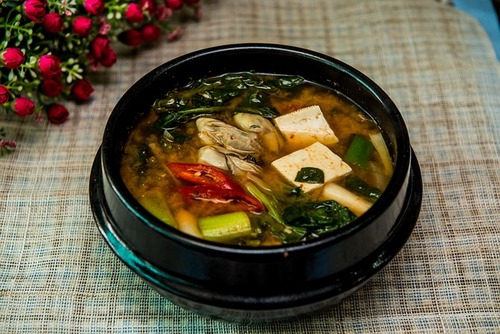Short answer
Traditional miso soup from non-genetically modified ingredients is not bad for you in small quantities. In spite of the many health benefits, it is high in sodium and soy.
Recommended Alternative
Long answer
Miso soup is a broth-like soup traditional to Japanese cuisine. 75% of the population in Japan consumes miso soup with at least one of their daily meals. Miso soup is made by combining miso paste with a stock called dashi. Miso paste is made with fermented soybeans, fungus, salt, and sometimes rice or barley.
Miso paste that has been allowed to ferment for longer periods of time produces a stronger, deeper flavored soup with a red color. White miso is produced when the miso is fermented for a shorter period of time. White miso has a sweeter, lighter flavor than red miso. The stock, or dashi, is traditionally made from dried baby sardines, dried kelp, dried thin smoked tuna shavings, or dried shitake mushrooms.
Solid ingredients may also be added to the soup. They are selected to provide color, flavor, and texture, and according to custom, provide a seasonal component. Common ingredients might be seaweed, onions, potatoes, shrimp, fish, mushrooms, clams, and sliced daikon. The ingredients are chosen so that there are some things that float, and heavier additives that sink to the bottom.
Miso soups are low in calories and high in protein, making them a healthy option for many people. As an easily digestible meal, it gives the digestive system a break, which is a known benefit for health. Additionally, miso is full of nutrients, dietary fiber, enzymes, vitamins B2, B12, E, and K. It contains good bacteria, which is beneficial to the stomach and aids digestion. In addition, it is high in antioxidants that protect the body from free radicals and assists in preventing the negative impacts of aging.
The main risk associated with miso soup is the high sodium content. One tablespoon of miso paste, the approximate quantity needed to make one cup of soup, contains about 600mg of sodium. This is about 25% of the daily allowance for a healthy adult. Another potential downfall to this soup is the soy content. Soy is a known allergen for many people. Additionally, 90% of all soy grown in the US is genetically modified.
While traditionally made miso soup in Japan contains fish and a good amount of protein, in the US, the broth is often vegetable-based, making it less expensive and faster to produce. A healthier alternative would be to boil an organic free-range chicken. Set the chicken aside for other use. Add healthy organic vegetables to your desired thickness and enjoy your healthier version. You could forgo the vegetables all together to produce a soup that is very digestive friendly.
Possible short-term side effects
- dehydration
- soy allergies
Possible long-term side effects
- hypertension
- heart disease
- risks associated with gmos
- risks associated with soy
Ingredients to be aware of

Benefits
- promotes digestive health
- high in vitamins
- high levels of good bacteria and fungi
- high in fiber
- high in antioxidants
Healthier alternatives
- homemade organic chicken broth with fresh organic vegetables
Our Wellness Pick (what is this?)
Kikkoman Instant Miso Soup
- Convenient instant soup
- Rich in soy protein
- Contains tofu pieces
- Three-pack bundle
- Authentic Japanese flavor
 Approved by
Approved by 















